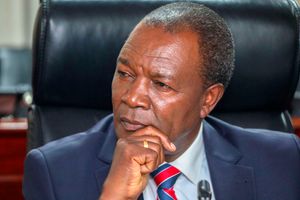
The Controller of Budget Margaret Nyakang'o when she appeared before the departmental committee on Finance and National Planning at the Continental House Nairobi on Wednesday, May 15, 2024.
Controller of Budget Margaret Nyakang’o has raised the alarm over transparency of some requisitions for withdrawals made by the National Government for payment of domestic debt, which are done manually, and lack specifics.
Dr Nyakang’o told the National Assembly Committee on Finance and National Planning that since July last year, there have been requisitions and payments of domestic debt done off-system, raising concerns about accountability and transparency.
While exposing the transactions taking place, Dr Nyakang’o said her office is unable to track payments and requisitions done manually since such payments leave no traceable documents for review.
Appearing before the Molo MP Kimani Kuria-led committee regarding the 2025 Budget Policy Statement (BPS), Dr Nyakang’o questioned why the government would choose to make selected payments using a manual system despite existence of an automated system for such transactions.
The Controller of Budget told the team some requisitions submitted for her approval lack specifics, as they are presented in lump sums, making it difficult for her office to determine how the money will be used since the payments are made off-system.
“I must raise this issue with the National Treasury in writing because I now have enough data. Why are we still making payments manually when we have an automated system?” Dr Nyakang’o said.

Cabinet Secretary for National Treasury and Economic Planning John Mbadi before the National Assembly Public Debt and Privatisation Committee at Continental House Nairobi on November 28, 2024.
“At the end of the quarter, they submit lump sum returns, which still lack specifics on how the money was spent. We have had to reject some of the returns because they lack details,” she added.
While Dr Nyakang’o did not provide a specific figure on how much the government has paid off-system since July last year, she assured the committee that she has all the details of the requisitions made and will compile them for onward transmission to Parliament on Tuesday.
Dr Nyakang’o stated that she processes 115 requisition files per week for public debt payments and 30,000 files annually for pensions.
She revealed that in January this year, the government paid Sh19.6 billion in dollars to local banks that had guaranteed a Kenya Airways bailout loan.
She questioned why local banks would demand payment in dollars.
More concerning, Dr Nyakang’o told the committee is that when her office received a government report on the expenditure of Sh18 billion, the amount was not specified.
“These things happen. Sometimes we try to get information, but it’s not easy,” Dr Nyakang’o said.
To address these concerns, Dr Nyakang’o revealed that the Central Bank of Kenya had initiated a framework referred to as "twinning," ensuring that the figures she approves match the amounts disbursed by the bank.
“I hope this new system will work,” Dr Nyakang’o said.
The committee chairman directed Dr Nyakang’o to provide the committee with all details of requisitions made manually during this financial year so that they can follow up with National Treasury officials, who are expected to appear before the committee next week.
“For a government with all its systems online, why should we pay our debt manually?” Mr Kimani asked.
“We cannot insist on paying small fees electronically while settling our debts manually. We will raise these issues with the Cabinet secretary in our meeting next week,” he added.
Kitui Rural MP David Mwalika, a member of the committee, termed the trend worrying, stating that public debt consumes most of the taxes collected and should, therefore, be handled transparently, with details on how every coin is spent.
“Public debt has been one of our major headaches as a country, yet now we are being told that these payments have been processed manually. The question we must ask is why? And the CoB must help us get answers,” Mr Mwalika said.
“This is a clear indication that there is a lot of money in this country that we don’t know where it’s going. Why pay manually when we have all our systems in place?” he posed.
The country’s exact public debt has always been shrouded in secrecy, with different figures frequently being provided.

Controller of Budget Margaret Nyakango.
During his vetting, Mr Mbadi promised to make public all details of the country’s public debt so that Kenyans could know who they owe and at what cost.
However, the process has been slow, as the team from the Auditor General’s office tasked with auditing the country’s debt has yet to release its report. The process started in September last year.
“Depending on the outcome of the audit, we will finally know the authenticity of the debts. We will use this information to make informed management decisions as the executive,” Mr Mbadi said.
He said the report would be submitted to Parliament allowing MPs to question the executive as per their mandate.
“I am optimistic that the audit will provide the crucial data necessary to guide future budgeting and ensure the country adopts a more sustainable financial path,” Mr Mbadi said.
According to the National Treasury's Medium-Term Debt Management Strategy (MTDS), published in January last year and covering the period 2024/25–2026/27, public and publicly guaranteed debt in nominal terms as of June 30, 2023, stood at Sh10.2787 trillion (70.8 per cent of GDP).
This comprised external debt stock of Sh5.4465 trillion and domestic debt of Sh4.8321 trillion.
This means that the present value of public debt was 68.2 per cent of GDP, exceeding the approved debt anchor of 55 per cent of debt to GDP.
The Medium-Term Debt Management Strategy is a policy document that guides government borrowing and public debt management to ensure sustainability.









